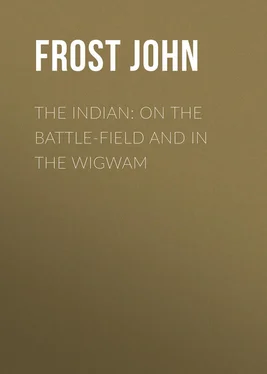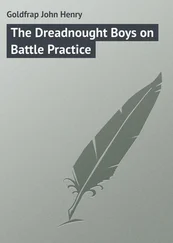John Frost - The Indian - On the Battle-Field and in the Wigwam
Здесь есть возможность читать онлайн «John Frost - The Indian - On the Battle-Field and in the Wigwam» — ознакомительный отрывок электронной книги совершенно бесплатно, а после прочтения отрывка купить полную версию. В некоторых случаях можно слушать аудио, скачать через торрент в формате fb2 и присутствует краткое содержание. Жанр: foreign_antique, foreign_prose, на английском языке. Описание произведения, (предисловие) а так же отзывы посетителей доступны на портале библиотеки ЛибКат.
- Название:The Indian: On the Battle-Field and in the Wigwam
- Автор:
- Жанр:
- Год:неизвестен
- ISBN:нет данных
- Рейтинг книги:5 / 5. Голосов: 1
-
Избранное:Добавить в избранное
- Отзывы:
-
Ваша оценка:
- 100
- 1
- 2
- 3
- 4
- 5
The Indian: On the Battle-Field and in the Wigwam: краткое содержание, описание и аннотация
Предлагаем к чтению аннотацию, описание, краткое содержание или предисловие (зависит от того, что написал сам автор книги «The Indian: On the Battle-Field and in the Wigwam»). Если вы не нашли необходимую информацию о книге — напишите в комментариях, мы постараемся отыскать её.
The Indian: On the Battle-Field and in the Wigwam — читать онлайн ознакомительный отрывок
Ниже представлен текст книги, разбитый по страницам. Система сохранения места последней прочитанной страницы, позволяет с удобством читать онлайн бесплатно книгу «The Indian: On the Battle-Field and in the Wigwam», без необходимости каждый раз заново искать на чём Вы остановились. Поставьте закладку, и сможете в любой момент перейти на страницу, на которой закончили чтение.
Интервал:
Закладка:
John Frost
The Indian: On the Battle-Field and in the Wigwam
PREFACE
These sketches are drawn from a great variety of sources, and are intended, not only to exhibit the Indian character in all its phases, but to comprise in a small compass a valuable collection of narratives of Indian warfare, embracing views of their peculiar methods of strategy, ambuscades, and surprises – their treatment of prisoners, and their other characteristic manners and customs.
By the aid of Mr. Croome, and other eminent artists, I have been able to illustrate the volume quite profusely with engravings. I trust that the work will be found a useful as well as interesting contribution to historical literature.
INDIAN GRATITUDE
OT long after Connecticut began to be settled by the English, a stranger Indian came one day to a tavern in one of its towns in the dusk of the evening, and requested the hostess to supply him with something to eat and drink; at the same time he honestly told her that he could not pay for either, as he had had no success in hunting for several days; but that he would return payment as soon as he should meet with better fortune.
The hostess, who was a very ill-tempered woman, not only flatly refused to relieve him, but added abuse to her unkindness, calling him a lazy, drunken fellow, and told him that she did not work so hard herself, to throw away her earnings upon such vagabonds as he was.
There was a man sitting in the same room of the tavern, who, on hearing the conversation, looked up, and observing the Indian’s countenance, which plainly showed that he was suffering severely from want and fatigue, and being of a humane disposition, he told the woman to give the poor wanderer some supper, and he would pay for it.
She did so: and when the Indian had finished his meal, he turned towards his benefactor, thanked him, and told him that he should not forget his kindness. “As for the woman,” he added, “all I can give her is a story – if she likes to hear it.” The woman, being now in a rather, better temper, and having some curiosity to hear what he had to tell, readily consented, and the Indian addressed her as follows:
“I suppose you read the Bible?” The woman assented. “Well,” continued the Indian, “the Bible say, God made the world, and then he took him, and looked on him, and say, ‘It’s all very good.’ Then he made light, and took him, and looked on him, and say, ‘It’s all very good.’ Then he made dry land, and water, and sun, and moon, and grass, and trees, and took him, and say, ‘It’s all very good.’ Then he made beasts, and bird, and fishes, and took him, and looked on him, and say, ‘It’s all very good.’ Then he made man, and took him, and looked on him, and say, ‘It’s all very good.’ And last of all he made woman , and took him, and looked on: him, and he no dare say one such word. ” The Indian, having told his story, departed.
Some years after, the man who had be friended the Indian had occasion to go some distance into the wilderness between Litchfield and Albany, which is now a populous city, but then contained only a few houses. Here he was taken prisoner by an Indian scout, and carried off into Canada. When he arrived at the principal settlement of their tribe, which was on the banks of the great river St. Lawrence, some of the Indians proposed that he should be put to death, in revenge for the wrongs that they had suffered from the white men; and this probably would have been his fate, had not an old Indian woman, or squaw, as they are called, demanded that he should be given up to her, that she might adopt him in place of her son, whom she had lately lost in war. He was accordingly given to her, and, as it is customary under such circumstances, was thenceforth treated in the same manner as her own son.
In the following summer, as he was one day at work in the forest by himself, felling trees, an Indian, who was unknown to him, came; up and asked him to meet him the following day at a certain spot which he described. The white man agreed to do so, but not without some apprehension that mischief was intended. During the night these fears increased to so great a degree, as effectually to prevent his keeping his appointment.
However, a few days after, the same Indian, finding him at work, mildly reproved him for not keeping his promise. The man made the best excuse he could, but the Indian was not satisfied until he had again promised to meet him the next morning at the place already agreed on.
Accordingly, when he arrived at the spot, he found the Indian already there, provided with two muskets and powder, and two knapsacks. The Indian ordered him to take one of each, and to follow him. The direction of their march was southward. The man followed without the least knowledge of what he was to do, or whither he was going, but he concluded that if the Indian intended to do him harm, he would have despatched him at the first meeting, and certainly would not have provided him with a musket and powder for defence. His fears, therefore, gradually subsided, although the Indian maintained an obstinate silence when he questioned him concerning the object of their expedition.
In the day time they shot and cooked as much game as they required, and at night they kindled a fire by which they slept. After a fatiguing journey through the forest for many days, they came one morning to the top of a hill from which there was the prospect of a cultivated country, interspersed with several snug farm-houses.
“Now,” said the Indian to his joyful companion, “do you know where you are?”
“Yes,” replied he, “we are not ten miles from my own village.”
“And do you not remember a poor Indian at the tavern? – you feed him – you speak kind to him – I am that poor Indian; – now go home.” Having said this, he bade him farewell, and the man joyfully returned to his own home.
INDIAN FRIENDSHIP
OME of the earlier settlers of Virginia acted in the most barbarous manner towards their Indian neighbors, and it is, therefore, not wonderful that they sometimes received a terrible punishment. But though revenge was usually uppermost in the breasts of the injured ones, instances occurred in which the sacred feeling of friendship triumphed over that passion and the prejudice of the race.
On one occasion, Colonel Bird was employed by the English government to transact some business with the tribe of Cherokees. It unfortunately happened that a short time before he went among them, some white people had seized two Indians, who had given them some trifling offence, and had put them to death; and the Indians, indignant at the outrage, determined to take revenge whenever the opportunity offered. The appearance of Colonel Bird presented the wished-for opportunity, and consultations were held as to the most effectual means of getting him into their power, and of making him the sacrifice.
Colonel Bird perceived their intentions, and felt that he had just cause for alarm, as he was in their country, without the means of escape. Among the neighboring Cherokees, was one named Silouee, celebrated as a chief and pow-wow , or medicine man. He had known Colonel Bird for some time, had eaten with him, and felt a deep friendship for him. Silouee told Colonel Bird not to be alarmed, and even assured him that the Indians should not injure him. At length, in a general council of the chiefs and old men of the tribe, it was determined in spite of Silouee’s earnest remonstrances, that Colonel Bird should be put to death in revenge for the loss of their countrymen.
Two warriors were despatched to Colonel Bird’s tent, to execute the cruel sentence. Silouee insisted on accompanying them. On reaching the tent, Silouee rushed in before them, threw himself on the bosom of his friend, and as the warriors approached, he exclaimed, “This man is my friend; before you take him, you must kill me.”
Читать дальшеИнтервал:
Закладка:
Похожие книги на «The Indian: On the Battle-Field and in the Wigwam»
Представляем Вашему вниманию похожие книги на «The Indian: On the Battle-Field and in the Wigwam» списком для выбора. Мы отобрали схожую по названию и смыслу литературу в надежде предоставить читателям больше вариантов отыскать новые, интересные, ещё непрочитанные произведения.
Обсуждение, отзывы о книге «The Indian: On the Battle-Field and in the Wigwam» и просто собственные мнения читателей. Оставьте ваши комментарии, напишите, что Вы думаете о произведении, его смысле или главных героях. Укажите что конкретно понравилось, а что нет, и почему Вы так считаете.









![John Bruce - The Lettsomian Lectures on Diseases and Disorders of the Heart and Arteries in Middle and Advanced Life [1900-1901]](/books/749387/john-bruce-the-lettsomian-lectures-on-diseases-and-disorders-of-the-heart-and-arteries-in-middle-and-advanced-life-1900-1901-thumb.webp)


